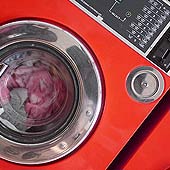|
Xeros Ltd, a University of Leeds spin-out, is commercialising a cleaning technology that needs less than 2 per cent of water and energy a conventional washing machine uses. Researchers at the University of Leeds have developed a new way of cleaning clothes using less than 2 per cent of the water and energy of a conventional washing machine. The revolutionary technology will provide alternatives to both domestic washing and dry cleaning, heralding the world's first ''virtually waterless'' washing system.  Xeros Ltd, a University of Leeds spin-out, is commercialising the technology with some of the biggest names in the washing and dry-cleaning industries. Xeros Ltd, a University of Leeds spin-out, is commercialising the technology with some of the biggest names in the washing and dry-cleaning industries.
The process is based on the use of plastic granules (or chips) which are tumbled with the clothes to remove stains. A range of tests, carried out according to worldwide industry protocols to prove the technology performs to the high standards expected in the cleaning industry, show the process can remove virtually all types of everyday stains as effectively as existing processes whilst leaving clothes as fresh as normal washing. In addition, the clothes emerge from the process almost dry, reducing the need for tumble-dryers.
Xeros' technology uses as little as a cup of water in each wash cycle and could also bring benefits to other industrial processes such as wastewater treatment and metal degreasing. According to Waterwise, a UK NGO focused on decreasing water wastage in the UK, washing machine use has risen by 23 per cent in the past 15 years, up from three times a week in 1990 to an average of four times a week per household today. The average UK household uses almost 21 litres of water each day on clothes washing - 13 per cent of daily household water consumption. This accounts for approximately 455 million litres of water daily, enough water to fill 145 Olympic size swimming pools. Tests are currently underway in the dry-cleaning market with a view to replacing certain solvents that are currently used in dry-cleaning. Some of these solvents are potentially harmful, having been linked with certain types of cancer and some are now facing a ban in various states in the US. The company believes that its new proprietary technology would eradicate the need for these solvents from dry-cleaning providing safety and monetary incentives for the dry cleaning industry. The new technology could be on the UK market as early as 2009. Xeros has recently received funding of £500,000 from the University's intellectual property commercialisation partnership with IP Group, subject to certain milestones being met. The IP Group specialises in commercialising university technology. Xeros was established in February 2007, after 30 years of research, to commercialise a new patented washing method invented and developed in the School of Design at the University of Leeds. Company founder, Professor Stephen Burkinshaw, is an internationally-recognised expert in the science of textiles and dyeing who has created considerable intellectual property in the area.  Professor Burkinshaw, professor of textile chemistry and director of Xeros, said, ''The performance of the Xeros process in cleaning clothes has been quite astonishing. We've shown that it can remove all sorts of everyday stains including coffee and lipstick whilst using a tiny fraction of the water used by conventional washing machines. The investment from IP Group will help us to accelerate the commercialisation of the technology and I look forward to seeing new washing and dry-cleaning machines that use the Xeros technology.'' Professor Burkinshaw, professor of textile chemistry and director of Xeros, said, ''The performance of the Xeros process in cleaning clothes has been quite astonishing. We've shown that it can remove all sorts of everyday stains including coffee and lipstick whilst using a tiny fraction of the water used by conventional washing machines. The investment from IP Group will help us to accelerate the commercialisation of the technology and I look forward to seeing new washing and dry-cleaning machines that use the Xeros technology.''
A typical washing machine uses about 35kg of water for every kg of clothes that are washed - as well as large amounts of energy to heat the water and to dry the clothes afterwards. With environmental concerns becoming increasingly urgent and water becoming an increasingly scarce resource, there is an urgent need to reduce the amount of water and energy used for washing clothes. In designing the Xeros cleaning process, Professor Burkinshaw harnessed the property of polymers to transform under humid conditions and become absorbent. He said, ''Dirt is not just attracted to the surface, it is locked into the centre. This is exactly what happens when Xeros nylon beads are gently tumbled with dampened garments.'' Dr Rob Rule, managing director of Techtran Ltd, IP Group's Leeds business, and a director of Xeros, said: ''This is one of the most surprising and remarkable technologies I've encountered in recent years. Xeros has the ability to save billions of litres of water per year and, we believe, the potential to revolutionise the global laundry market. '' The potential revenues for machines based on the Xeros technology are considerable as over two million washing machines are sold in the UK annually, valuing the UK market alone at around £1 billion. GreenEarth partnership
In a deal which heralds the next stage in the company's evolution, Xeros announced in June 2009 a partnership with US dry cleaning technology group GreenEarth. The deal with GreenEarth will result in Xeros' laundry cleaning technology being distributed to the retail dry cleaning industry.
GreenEarth, which currently licenses its patented silicone-based dry cleaning technology around the world, will have exclusive rights to distribute the technology throughout North America to retail dry cleaners. Bill Westwater, Xeros' chief executive officer, said, ''Our partnership with GreenEarth is a critical piece of this project. They are not only experts in licensing and marketing environmentally sound technologies, they stand apart in the dry cleaning community as a company genuinely committed to creating solutions and new opportunities.'' Xeros was developed and patented after 30 years of research by world-class polymer scientists at Leeds, led by Stephen Burkinshaw, Professor of Textile Chemistry. The company has received funding from the University's commercialisation partner, IP Group. Professor Burkinshaw said: ''Stains behave just like dyes and nylon polymers have an inherent polarity that attracts stains. Picture how white nylon garments can get dingy over time as dirt builds up on the surface despite repeated washing.'' In designing the Xeros cleaning process, Professor Burkinshaw harnessed the property of polymers to transform under humid conditions and become absorbent. He said, ''Dirt is not just attracted to the surface, it is locked into the centre. This is exactly what happens when Xeros nylon beads are gently tumbled with dampened garments.'' The tiny nylon polymer beads are designed to gently but fully penetrate into a large wash load. Only a small amount of water is required to dampen the garments, loosen stains and create the water vapour that activates the ''molecular magic'' of the beads. The beads are then tumbled with the clothes, allowing the polarizing properties of polymer to attract and absorb dirt. Once diffused into the bead itself, stains are locked away from the garment, preventing re-deposition. Ron Benjamin, GreenEarth Cleaning Managing Director, said: ''We honestly believe Xeros will change the way we launder clothes while helping to conserve our fresh water supply. What a remarkable concept-wet cleaning that no longer sends water down the drain.''
GreenEarth Cleaning will be the exclusive licensor of the patented Xeros technology to retail dry cleaners in North America; it will also have the right to license to existing GreenEarth Affiliates in every country around the world.
|